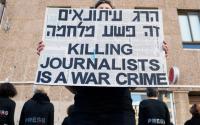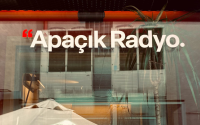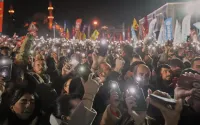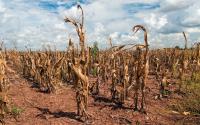No one is sure if we are any closer to defeating Bin Laden, but already this war has produced plenty of winners - from the singer Enya to Lloyd's of London. A special report on the people and companies who have benefited from September 11 and events since then
Guardian,Wednesday October 31, 2001
Security
Amid sweeping job losses across America, anyone with any expertise in high-level security has a valuable curriculum vitae. Reversing a decades-old trend of relying more on cameras and hardware than security experts, corporate America is hungry to hire former FBI and military counterintelligence specialists. Stock in security firms has soared. "We are just catching up with most of the rest of the world," says Richard Maurer, of EDI Ltd Consulting Engineers. "The days of the security officer reading a book in the lobby have gone."
In the UK, similarly, private and corporate security advisers have found themselves much in demand. One such firm, Inkerman Group, has had a rush of corporate and individual inquiries since September 11. "Business has picked up," says its managing director, Gerald Moor. "We offer risk management and personal protection services, as well as aviation security advice and protection. The latter has been in huge demand, both from corporate clients and private individuals who are trying to decide whether it's safe to fly.
"What has been extraordinary is the number of what you might call normal people - well-educated, rational people - ringing up and asking whether it's true that the tube is going to be gassed on Thursday."
The City
While immediate "losers" have been easy to spot on the financial markets, "winners" have been harder to find - partly because no one wants to brag about good results, and because information is still working through the economy about how the tragedy has affected a wide spectrum of businesses.
Some at Lloyd's of London fell into the trap of talking openly about the "historic opportunity for profitable underwriting" since September 11, in a newsletter sent to Names - the individuals who provide private capital for Lloyd's insurance activities.
The newsletter detailed the increases in insurance premiums, post-September 11: airline premiums up by 400%-600%, war premiums on planes and ships up between 500%-1,400%. "Lloyd's is currently enjoying one of the strongest markets in living memory," the newsletter boasted. The remarks drew criticism from MPs for their insensitivity, but the newsletter also contained chilling details of the massive claims some insurance syndicates are facing as a result of the World Trade Centre's destruction.
Protective equipment
A number of companies have been quick to spot a silver lining to the grey cloud of America's anthrax panic. A Michigan firm, Polaris International, is marketing the Bio-Shelter, a plastic tent that looks like a large square bubble and comes complete with an air-filtration system. Polaris says the product will keep the whole family safe in the event of a germ attack. The Bio-Shelter costs $1,975 (£1,359). So far the company has sold just 15 but Manny Peraza, its president, told the New York Times: "Once the general public knows about this item, we'll have a hard time keeping it on the shelf."
Biorecovery Inc, a company that specialises in the highly unpleasant business of cleaning blood from crime scenes, is now offering to clean anthrax-contaminated offices. Last week, it charged some hundreds of thousands of dollars to clean the headquarters of ABC News. "It is not like cleaning an office with a mop and a rag," says its president, Ronald Gospodarski.
The anthrax attacks have also created a lucrative anxiety about opening mail in companies on both sides of the Atlantic. A firm called N-B-C-Warfare (the letters stand for Nuclear, Biological, Chemical) is offering a post room protection package for $512. It includes a protective body suit, a gas mask, and a pink plastic container with matching lid that the company calls a "suspicious mail receptacle".
Here, the Bristol-based Safelab Systems makes filtration systems which allow workers in post rooms to open letters and parcels in safety via a sealed cabinet. These cost between £1,000 and £2,000, depending on size. Dr George Sarossy, the company's managing director, says there has been a "fantastic increase" in inquiries from firms wishing to purchase his Safe-Mail-Check cabinet.
Publishing
The September 11 attacks have sparked massive public interest in the hitherto obscure arena of Islamist politics, central-Asian oil reserves, post-Soviet Afghanistan and the structure of the Taliban and al-Qaida. The chief beneficiaries of this voracious appetite for information are the authors and publishers of half a dozen books, the success of which could not have been forecast when they were commissioned.
The New Jackals: Ramzi Yousef and the Future of Terrorism by Simon Reeve, an account of the 1993 attack on the World Trade Centre, was rushed into paperback when the hardback sold out within days of September 11. In the US, Yale University Press publish Ahmed Rashid's Taliban: Islam, Oil and the New Great Game in Central Asia and reports that since September 11 the book has sold a staggering 230,000 copies - helped not least by the revelation that it is Tony Blair's current bedtime read. Before the attacks, it had sold just 6,000.
Reaping the Whirlwind by Michael Griffin, another popular recommended read of the last seven weeks, has seen a similar rise. Its UK publisher, Pluto Press, says it has helped the company record a 100% leap in sales since this time last year. Tom Carew's Jihad! The Secret War in Afghanistan has sold 40,000 copies and been reprinted four times since September 11, says Bill Campbell, director of Mainstream Publishing. He originally expected it to sell 8,000 copies.
"At the Frankfurt book fair a fortnight ago there was talk of little else," says Joel Rickett, news editor of the Bookseller. "There have been some interesting beneficiaries. Stacey International, a small UK publisher of books on the Middle East, has just signed a deal with a major US distributor for 40 books on Islam. Prior to that they couldn't get a single book into US stores."
Flags
The patriotic fervour sweeping the US in the wake of the attacks has created the biggest boom in more than a decade in the $200m flag market. Nearly two months on, demand for the Stars and Stripes is 100 times more than usual. Domestic manufacturers can't keep up with demand, but opportunists trying to break into the lucrative business of US flags are having a hard time finding suppliers. Foreign flag makers, often in China and Taiwan, say business has increased 10-fold.
Luxury goods
Better the devil you know than the devil you don't: Manhattan women, anxious about a spore they don't know, are turning to a toxin they do - botulism. In recent weeks, even the traditional shopping cure has not been enough to fend off post-September 11 melancholy and cosmetic surgeons have reported a rise in bookings, especially for Botox injections. This involves using botulism toxin to paralyse facial muscles, to ward off wrinkles and frown lines. "Patients are saying, 'If not now, when?' " says Leida Snow, a spokeswoman for the American Society for Aesthetic Plastic Surgery.
Large numbers of Manhattan women are also reportedly trading high heels for trainers. The entire fashion department of Vanity Fair was recently equipped with Puma trainers for a quick exit from the Condé Nast magazine offices in Times Square.
People
Two years ago, Ashleigh Banfield was a local news anchor in Dallas with a reputation as a woman about town who sang in a rock band, smoked cigars and was a part-owner of a chic pool hall. Last week, she was in Islamabad, Pakistan, as the lead overseas war anchor for MSNBC television, and as such has become the first new star of the conflict.
"There is so much buzzing about Ms Banfield - both her smart, self-effacing delivery and her low-key stylish look - that she might be a contender for a new kind of fashion figurehead," wrote Kate Betts, former editor of Harper's Bazaar.
While most of the media focused on the extraordinary transformation in the fortunes of Rudy Giuliani, the mayor of New York, another political beneficiary of the events of September 11 went largely unnoticed. In the months preceding the attacks, Gary Condit, the Democratic congressman from California who was then embroiled in a scandal over a missing female intern, was experiencing the full glare of US media attention. In his new-found obscurity he has announced, almost unnoticed, that he intends to seek re-election for an eighth time - which would have seemed impossible before. Ironically, even his political currency within Washington seems to have grown: he was recently appointed to a house subcommittee on counter-terrorism. In a bizarre footnote, Hallowe'en mask manufacturers in the US have said they are ditching a previous top-seller, the Gary Condit mask, and rushing out firefighter hats instead.
Music
The new-age Celtic warbler Enya has been another unlikely beneficiary of September 11. Music from her ambient 2000 album A Day Without Rain was heavily featured by the news networks as background music to accompany the shocking images of the aftermath. The album has sold more than 4m, shooting into the Billboard chart at number two.
Media
The attacks have been a boon to news ratings. CNN is drawing an average audience of 1.8m, up from about 330,000 in August when shark attacks and the Gary Condit non-story put the nation to sleep. The Fox news channel's average audience has been 1.1m, up from about 311,000. MSNBC's has been 900,000, up from 229,000. But there has been a downside too for these companies. The far-flung and open-ended nature of the conflict mean that editorial budgets are being stretched to breaking point. And the acceleration of the global advertising recession has delivered a corresponding, and potentially catastrophic, downturn in revenue.
Newspapers and broadcasters have invested millions in sending correspondents and equipment to the Middle and Far East. Such is the expense that budgets in other areas have had to be trimmed. Nevertheless, audiences for news programmes and sales of newspapers have increased significantly. In Britain, winners have included the Mirror, which has won acclaim for its serious-minded but populist approach to the conflict; BBC News 24, whose erstwhile critics are now praising it; and the Guardian, which has experienced the biggest percentage sales increase in the broadsheet market. The clearest media winner, though, is al-Jazeera, the previously unknown Qatari news channel which has been the only source of pictures from Kabul. Its logo is now a regular feature on TV screens across the world.
Transport
Despite bans placed on private planes in skies over US cities, the executive jet and charter business is booming. "We're having trouble getting enough pilots and aircraft to meet demand," says Drew Cheshire, of Aviation Research Group. "Some of it is fear of flying; some of it is the time flying now takes." Others are taking the train: fear of flying has caused a vast increase in passengers travelling on Amtrak, and increased support for rail projects which could offer an alternative to air travel. A new express service between Washington and Boston on trains which can reach speeds of up to 150 mph "has been swamped with people", according to an Amtrak spokesman.
In the airline industry, in which so many carriers have suffered, EasyJet has bucked the trend. With profits up 82% on this time last year and a 1.5m increase in passenger numbers up for the same period, the budget airline is to issue 26m new shares to help it buy extra planes to meet the demand and to exploit vacated landing slots left by its ailing rivals. Another unlikely beneficiary: Costa Coffee, part of the Whitbread group, reports sales at its Gatwick and Heathrow outlets are up 11% due to the increase in time passengers spend waiting for security checks.
Arms industry
"The purse is now open," said Harry C Stonecipher, vice-chairman of Boeing, America's second biggest defence contractor and just one of many groups expecting a huge increase in military spending on new and upgraded equipment. But it's not just US political leaders who are considering increased defence spending post-September 11 to sustain what President Bush has repeatedly seen as a prolonged campaign to eradicate terrorism and its sponsoring states.
European countries, including the UK, France and even Germany, which has slashed its defence budget since reunification 11 years ago, are either planning to, or are under pressure to, raise spending and their military capability. This will benefit companies such as BAE Systems, the UK's biggest defence contractor, Rolls-Royce, Dassault and EADS, the Franco-German-Spanish combine.
In the US, the $40bn emergency extra spending approved by George Bush is likely to be dwarfed as new bills pass through Congress. The gains over the past seven weeks of up to 30% in defence companies' stocks, which had been out of favour, are also expected to be surpassed.
Pharmaceuticals
Although they would never admit it, drug companies are rubbing their hands with glee at the lucrative prospect of biological warfare. Many are trumpeting their patriotic efforts in providing vaccines for smallpox and treatments for anthrax, while privately marvelling at the dollar signs before their eyes.
For the struggling German firm Bayer, the anthrax panic has been something of a lifesaver. The company was considering pulling out of pharmaceuticals after the disastrous failure of an anti-cholesterol drug earlier this year. But Bayer has enjoyed huge demand for Cipro, the only licensed treatment for anthrax. The firm is supplying 100m tablets to the US government after reluctantly agreeing to cut the price to 95 cents per pill, still a comfortable profit, when threatened with the loss of its patent.
Meanwhile, 10 companies are clamouring for a contract worth a rumoured $500m to provide the US government with 300m doses of a smallpox vaccine. GlaxoSmithKline, American Home Products, Aventis and Baxter Laboratories are among the contenders.
Among the smaller players, PPL Therapeutics, best known for cloning Dolly the Sheep, saw its shares jump last week as investors recalled it had won a $3.1m grant from US authorities earlier in the year to produce antibodies against smallpox and ebola in the milk of transgenic cows.
Insurance
Faced with an indelible image of mortality, many Americans have elected to do what they had been putting off: buy life-insurance. One online broker, Insurance.com, says inquiries about life insurance went up 68% after the attacks. Travel insurance firms are also reporting increased business. Travel Guard Insurance, the largest US travel insurer, says that 33% to 50% of people have bought travel insurance since September 11, compared with 8% to 10% before. Claudia Fullerton of the San Diego-based CSA Travel Protection says phone inquiries about travel insurance are up 500%.
Countries
Russia is the main beneficiary of the changed international landscape. The scale of the change should become apparent in two weeks when the Russian president, Vladimir Putin, is scheduled to meet President Bush in Texas. In return for support for the international coalition and high-grade intelligence on Afghanistan, the US is set to agree with Putin a deal on America's missile plan, which Moscow has been opposing.
As part of that, the US is also expected to compromise on the anti-ballistic missile treaty, which Bush has been threatening to scrap. More significantly, Bush is also set to offer compromises on the expansion of Nato that would incorporate the Baltic states, which Russia has opposed. One of the wilder options, though no longer fantasy, is that Russia could be offered membership of Nato.
Iran, still classified by the US state department as a "state of concern" and sponsor of terrorism, is another beneficiary of the changed political landscape. Its opposition to the Taliban in Afghanistan offers Iran a chance to come in from the cold.
On the face of it, Pakistan would appear to be the biggest beneficiary after Russia, with a string of "goodies" heading towards Islamabad. Among these are the lifting of sanctions, debt relief, a say in the make-up of the next Afghan government and formal recognition of the existing Kashmir boundary with India. But there is huge risk attached for the leader of Pakistan, General Pervez Musharraf - internal opposition is building against him for helping the US.
Paul Kelso, Edward Helmore, David Gow, Leo Hickman, Matthew Wells, Ewen MacAskill, Richard Adams, Andrew Clark






